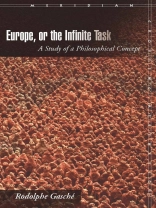What exactly does ‘Europe’ mean for philosophy today? Putting aside both Eurocentrism and anti-Eurocentrism, Gasché returns to the old name ‘Europe’ to examine it as a concept or idea in the work of four philosophers from the phenomenological tradition: Husserl, Heidegger, Patočka, and Derrida. Beginning with Husserl, the idea of Europe became central to such issues as rationality, universality, openness to the other, and responsibility. Europe, or The Infinite Task tracks the changes these issues have undergone in phenomenology in order to investigate ‘Europe’s’ continuing potential for critical and enlightened resistance in a world that is progressively becoming dominated by the mono-perspectivism of global market economics. Rather than giving up on the idea of Europe as an anachronism, Gasché aims to show that it still has philosophical legs.
เกี่ยวกับผู้แต่ง
Rodolphe Gasché is SUNY Distinguished Professor and Eugenio Donato Professor of Comparative Literature at the State University of New York at Buffalo. His most recent books are
Views and Interviews: On ‘Deconstruction’ in America (2007), and
The Honor of Thinking: Critique, Theory, Philosophy (Stanford, 2007).












